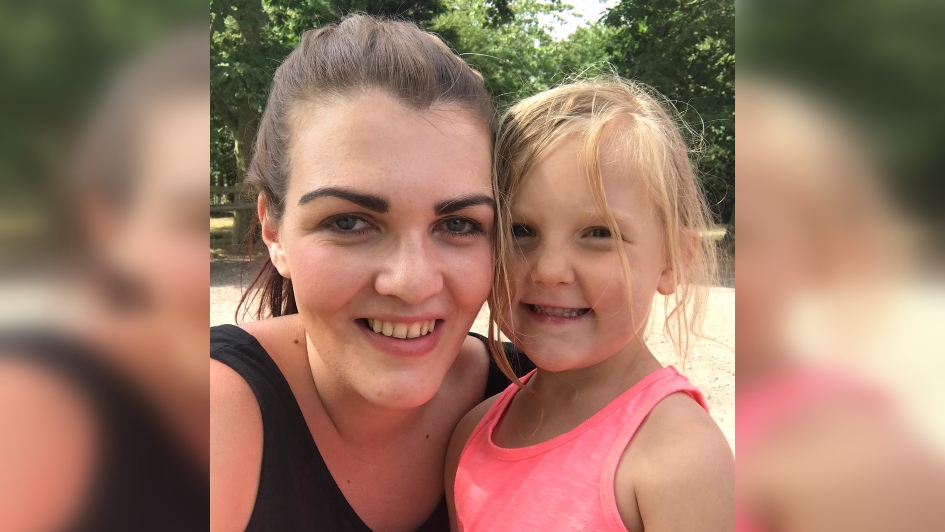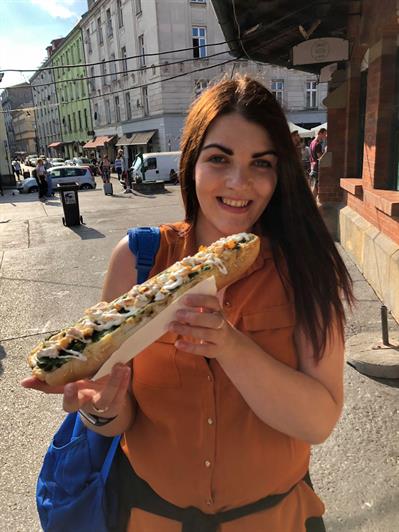
Image: Kate with her niece, Eva-Mae. Credit: Kate Parker
When I was 28, I made the decision to have a preventative double mastectomy. My mum had died of breast cancer in 2000 when I was 12 years old, and her sister passed away in 2015. When it was discovered that I also had the BRCA2 mutation, I wanted to do whatever I could to reduce my risk of getting cancer.
I had the mastectomy in 2016. Shortly afterwards, the skin around my breasts started to look like it had become infected so I took tablets, but three months later, when it still hadn’t cleared up, my GP sent me for blood tests to investigate.
The blood test results came back saying I had very high liver function levels, so I was referred for an ultrasound which showed a mass on my liver. I was told it wouldn’t be anything serious because I ‘was too young’ but, thankfully, I was sent for a CT scan and an MRI anyway, and then we found out there was a massive tumour on my liver.
At this stage, the doctors weren’t sure whether the tumour was benign or cancerous, but they knew it needed to be removed. Once it was removed, they did a biopsy, and this confirmed I had bowel cancer.
I was then booked in for a colonoscopy to find my primary tumour. The doctors couldn’t see the whole bowel as the tumour was so big, but they were confident I could have surgery to remove it.
‘I knew I had to just crack on’
But then a further scan showed the cancer had spread to my lungs, and I was inoperable.
My mum and auntie both died from cancer, and I used to look at them and think it was amazing they were so positive. Then suddenly I was in that position, and I knew I had to just crack on – there wasn’t any other option.
I started CAPOX chemotherapy in January 2018 and this worked quite well, but by the autumn of that year, everything had grown back. I then had three cycles of FOLFIRI chemotherapy, but I had to stop that because it caused a bowel blockage, and I had to stay in hospital over Christmas while an emergency stoma was fitted
It took quite a long time to recover from the blockage, but in February 2019 I was able to start FOLFOX chemotherapy. This kept me stable for almost seven months, but then it stopped working.
Fortunately, I was then able to join a clinical trial in Manchester for a targeted treatment. This worked really well – it held the lung tumours in place and even shrunk a couple of them. But then they spotted something new on my liver so I couldn’t stay on the trial.
That was really hard. As far as I was concerned, the treatment was still working.
‘The last chemotherapy option available to me’
In January 2020, I then started taking Lonsurf. This was the last chemotherapy option available to me on the NHS.
Lonsurf kept my tumours relatively stable but, just after starting my fifth cycle, I was accepted onto a new clinical trial which combines two drugs.
The first few cycles worked well, but at the same time I’d started getting headaches, and so I had a CT scan which showed the cancer had spread to my brain.
In November 2020, I had to have Gamma Knife radiosurgery to treat the four lesions in my brain, and then was able to resume my treatment on the trial.
There was progression after my eighth cycle, but I was allowed to stay on the trial as they said that things sometimes stabilise.
I was convinced that that was the end, but things did stabilise.

Image: Kate on holiday in Krakow, as part of her bucket list. Credit: Kate Parker
Life isn’t what I’d expected
But I’d been getting leg pain at the time we learned it had stabilised, and then I found it had spread to my bones. I’ve just had a hip replacement which has helped me a lot, and I’m going to be having radiotherapy in the area as a precaution.
I’m now on my 12th cycle of the drug combination, and will have another scan in two weeks to see how things are looking.
My life right now isn’t what I’d expected.
I’ve made a list of things I want to do when I can. I want to go to Tokyo to see the cherry blossoms, I want to do a road trip in America and visit Yosemite National Park and the Grand Canyon, and I want to have a flying lesson in a Spitfire.
I used to be scared of flying but, after my diagnosis, I got a big ‘stuff it’ attitude and thought why be scared.
I try to live with my cancer, but there always seems to be something new to deal with.
I think it’s so important to support research, because each new treatment is a lifeline for someone like me. I’m 33 years old, and there’s still so much I want to do.
Help us finish cancer
As well as being a world-leading cancer research institute, we are a charity.
Your support today will help us deliver urgently-needed smarter treatments for bowel cancer, and give people like Kate a chance to finish what they started.
Please donate today to help us finish cancer. Let’s finish cancer together.
Donate now
comments powered by